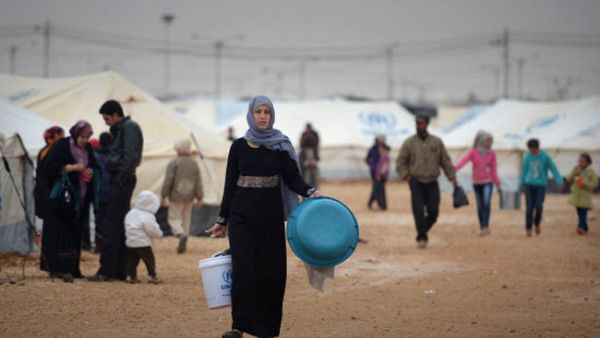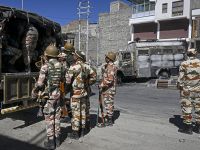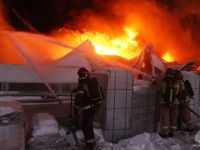Fatima, a Syrian refugee with a hearing impairment, has been given the opportunity to express herself in a way "she loves the most".
The 32-year-old was offered the space and tools required to practise her favourite hobby — drawing — at the Zaatari Refugee Camp.
Since her arrival at the camp, along with her sister, about two months ago, Fatima, has been going to one of the Noor Al Hussein Foundation's Institute for Family Health (IFH) sites that provide holistic services for refugees at the camp.
"She [Fatima] feels her best while she is drawing and forgets the difficulties we are facing as refugees," said Fatima's sister, Hanaa, whose husband had died recently in Syria, leaving her with seven children to take care of.
"Fatima paints what she hopes to have… the other day she painted an eagle because she wished that one would come and eat all the snakes in the camp," Hanaa told The Jordan Times on Tuesday during a media tour of the camp, which is near Mafraq, 80km northeast of Amman.
Recreational activities are not the only type of services provided by IFH in cooperation with the United Nations Population Fund (UNFPA), but refugees also receive psychological support and training to start their own projects.
IFH also provides awareness sessions on reproductive health and gender-based violence.
"Refugees come to the camp suffering from trauma, stress and fear. If they are not guided and assisted to handle these emotions, they resort to violence," IFH Director Manal Tahtamouni said, noting that the institute's psychological support team receives around 200 women and girls suffering from domestic violence each month.
"They do not come to us complaining about violence directly, but the experts discover that they are abused, whether emotionally, physically or sexually, through several activities, such as writing and drawing," Tahtamouni said.
She added that the experts also visit their tents to verify the information.
IFH has dealt with more than 10,000 refugees since the beginning of this year, about 300 each week, raising the number of beneficiaries since it started operating in August 2012 to more than 30,000.
Most of the beneficiaries are women and girls, but the institute also provides services to children and men, according to IFH.
"We offer lectures and workshops on anger management, violence and reproductive health for men," Tahtamouni said.
In addition, refugees are given the opportunity to work and be paid.
Under the Women and Girls Oasis, recently established by IFH in cooperation with UNFPA, women can learn new skills and work in income-generating projects.
"I can't imagine spending my day in the tent. I come here [the oasis] each day for six hours to meet up with other women and work," Um Mamoun said, adding that she gets JD1 ($1.40) per hour.
Um Mamoun, who did not give her full name, noted that she gets the latest news on Syria at these gatherings since she does not have a television in her tent.
She also brings two of her children along to the oasis, where they can go to the kindergarten and the play areas.
IFH area field manager, Bahaa Mheidat, said experts who deal with the beneficiaries are trained to gain their trust and handle their cases with the utmost confidentiality.
"Most of our experts are from Mafraq and Ramtha, and they share the same traditions and dialect as the refugees, which helps both parties create strong bonds," he noted.








